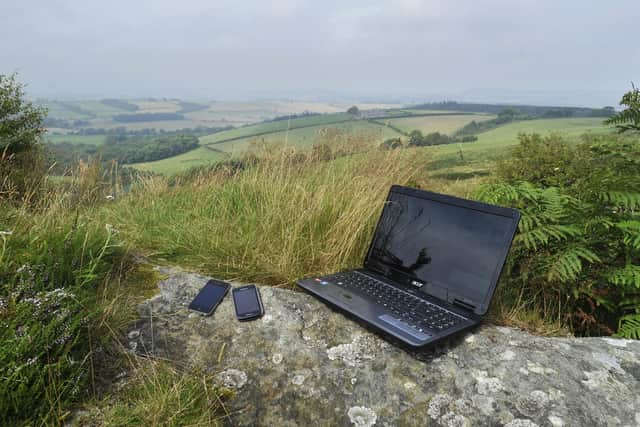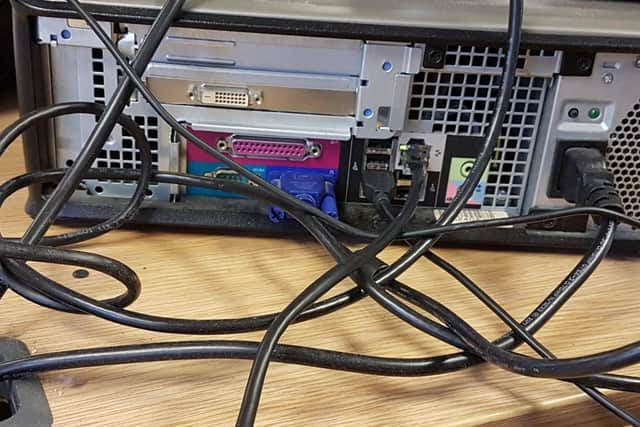Why faster broadband is new national priority – Andrew Vine
Everybody I know is suffering the same frustration as they watch that little wheel of doom on the laptop screen whirl interminably, drumming their fingers impatiently whilst each file takes an age to download.
Mine’s been so slow on occasion that it revives memories of the bad old days of dial-up connections which broadband was supposed to banish.
Advertisement
Hide AdAdvertisement
Hide AdAnd this in a big city, less than a mile from the BT exchange through which my internet is provided. Goodness knows how bad the connections are in Yorkshire’s more remote areas.


Lockdown is to blame, of course. As soon as millions swapped their offices and classrooms for the kitchen table or spare bedroom, the massive upsurge in demand on home broadband slowed everything down. Frustration at this is only part of the problem. Slow connections are potentially harming companies, by hampering the speed at which their staff can work.
Children may suffer, too. It’s quite enough of a challenge for them and their parents to keep up with lessons without the additional delays to downloading material vital to learning.
We’ve long had a problem in our country with access to fast, reliable broadband for all and this past year of crisis has underlined the urgent need for the Government to act.
Advertisement
Hide AdAdvertisement
Hide AdEven when lockdown has been eased, many more people are going to spend part of their working week at home, as caution about sparking a new surge in the pandemic becomes the norm and companies save money by moving to smaller, cheaper offices. There is already a demand from staff for flexibility, as they have found a mix of home and office fits better around family and childcare commitments. This cultural change demands that Britain gets vastly improved broadband.


It is as important a strategic issue as having a railway system fit to cope with the demands of the 21st century, or a roads network that allows businesses to transport their goods efficiently and on time.
Successive governments have recognised this, but been guilty of a dismal failure to get to grips with it. Here in Yorkshire, we know to our cost slow broadband is the bane of countless businesses’ lives in rural areas. It holds them back and is a serious obstacle to expanding and creating jobs.
That in turn is a key factor in the cycle of decline that so many market towns and villages suffer from, as the lack of jobs forces young people to move away to cities in search of work.
Advertisement
Hide AdAdvertisement
Hide AdThis cries out for action, yet a damning report by the Public Accounts Committee holds out only the prospect of the countryside being sold out yet again over broadband. A litany of failures means that the loudly-trumpeted Government pledge of ultra-fast broadband for all by 2025 won’t happen.


Worse, the committee believes that in a scramble to achieve a scaled-back target of 85 per cent of all properties, the Government is likely to prioritise densely-populated urban areas, and rural towns and villages “would once more go to the back of the queue”.
The countryside can’t afford that. Rural deprivation is already being made worse by poor broadband and the prospect of having to struggle with it for years to come – especially against a backdrop of trying to recover from the economic blow dealt by the pandemic – could cause irreparable harm.
All the talk about levelling up the economy from the Government amounts to hollow words unless it gives rural areas the broadband it deserves – and also improves urban connections.
Advertisement
Hide AdAdvertisement
Hide AdNor can any ambition for a massive expansion of the digital economy be taken seriously without such action.
Fast broadband has become such a fundamental necessity that it deserves a much higher priority in Government policy.
At present, it is lumped together with cyber security and online harms somewhere within the Department of Digital, Culture, Media and Sport.
It shouldn’t be there, but under the banner of the Department for Business, Energy and Industrial Strategy, which would be a proper acknowledgement of its importance because it’s at the heart of the way we work.
Advertisement
Hide AdAdvertisement
Hide AdThe wheel of doom isn’t just a frustration for everybody trying to get their work done – it’s the symbol of a country stuck in the slow lane when it needs to be putting its foot down.
Support The Yorkshire Post and become a subscriber today. Your subscription will help us to continue to bring quality news to the people of Yorkshire. In return, you’ll see fewer ads on site, get free access to our app and receive exclusive members-only offers. Click here to subscribe.
Comment Guidelines
National World encourages reader discussion on our stories. User feedback, insights and back-and-forth exchanges add a rich layer of context to reporting. Please review our Community Guidelines before commenting.